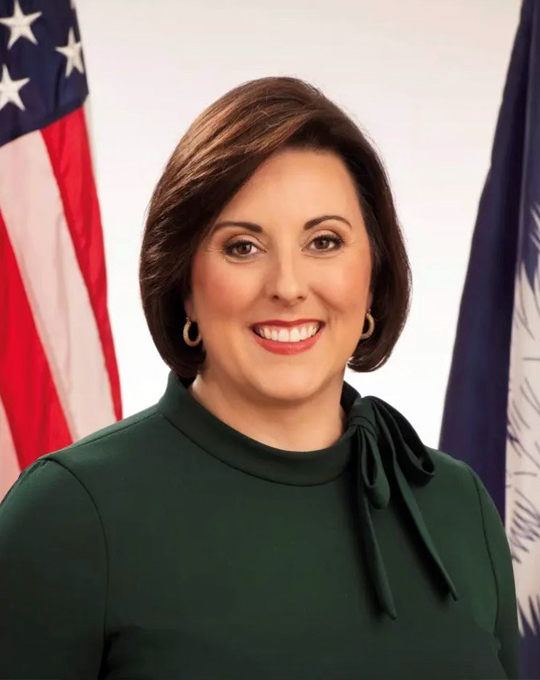State Superintendent of Education Ellen Weaver Shares Budget Priorities for 2024
February 5, 2024Last Tuesday, State Superintendent of Education Ellen Weaver presented the South Carolina Department of Education’s comprehensive budget priorities during a House Ways and Means subcommittee meeting. Tuesday’s budget hearing is the most recent step in the annual budget process that ultimately will provide funding for the 2024-25 school year.
Superintendent Weaver outlined the challenges South Carolina’s students, families, and educators face, reviewed efforts funded in the current year’s budget, and walked through the state Department of Education’s top priorities for next year.
“The future we want for our students is in view, and the path is evident,” Superintendent Weaver said. “We must have clarity of mission and vision and we must align our resources for highest impact. This budget aims to improve student success, boost teacher support, build workforce readiness, and enhance school safety.”
Improving Student Success:
This current year has featured an intense focus on literacy. The state is adopting new English Language Arts (ELA) curriculum paired with intensive professional development for literacy teachers in the early grades, in support of recently revised ELA standards.
Next year’s budget builds on that progress with a similar focus on Math, with a significant request for $186 million to pay for that acquisition cycle. The selection of new high quality math curriculum will be guided by streamlined standards and will support math instruction for years to come.
The SCDE has requested $10 million to implement the Palmetto Math Project. This initiative would be built on the demonstrated student success of the Palmetto Literacy Project, with a focus on state-led instructional coaching, high quality instructional materials, high quality professional learning, and high-dose tutoring.
In addition, SCDE is seeking about $3 million to establish a Character and Resiliency Education (CARE) and civics education initiative. This effort would seek to inspire students through structured character development curricula and supplementary materials that emphasize the unifying character traits outlined in the Profile of the South Carolina Graduate.
To support the state’s new Education Scholarship Account (ESA) program, known as the South Carolina Education Scholarship Trust Fund, Superintendent Weaver has requested $30 million to cover the full funding for the first year of the program. She emphasized research that shows the benefits of expanding the state’s education ecosystem with a new student-centered funding mechanism.
Boosting Teacher Support:
During Tuesday’s hearing, Superintendent Weaver discussed the ongoing effort to professionalize the teacher compensation system. She backs the Governor and General Assembly’s multi-year push to increase the minimum starting teacher salary to $50,000. To support these proposals, SCDE has requested an increase of $1,500 to each step on the salary schedule and an extension of teacher contracts by five days, which would continue the steady march to $50,000.
The teacher contract extension is intended to provide time for the high-quality professional development in reading and math referenced throughout her budget presentation. In addition, it provides compensation for days that many teachers are already working off-contract for free.
SCDE is also requesting funding for a strategic compensation pilot program and critical needs retention bonuses that work together to further modernize and professionalize the way we pay teachers.
“Research – and common sense – tell us that an effective teacher is the ‘secret sauce’ of student success. We believe that continuously investing in teachers’ skills is best for students and a vital way to treat teachers as professionals,” Superintendent Weaver said.
Building Workforce Readiness:
Superintendent Weaver highlighted a proposed initiative to build tomorrow’s workforce today. SCDE has requested funding to establish a program that would help cultivate high-demand skills in every corner of the state.
The funding for CTE Rural Renaissance would be used to create, expand, innovate, and implement high quality career programming in SCDE-identified areas of the state. It would expand programming for rural regions, including additional investments in mobile CTE equipment labs, crafting adaptive pathways for statewide implementation.
“The proposed project will empower students, our state’s greatest resource, with the opportunity to fill high paying jobs or continue their education while demonstrating to businesses and employers that South Carolina’s workforce is ready for present opportunities and future investments,” Weaver said.
Enhancing School Safety:
One of the agency’s top requests includes establishing a statewide uniform mapping system to assist first responders when responding to an emergency call at a local school. This technology would provide emergency personnel with site-specific labeling that matches the structure of the school building and grounds, overlaid on current aerial imagery of the property.
Superintendent Weaver has also asked lawmakers to fund another round of one-time school facilities safety upgrade grants.
“We know nothing matters if our students and staff aren’t safe,” Weaver told lawmakers Tuesday afternoon.














